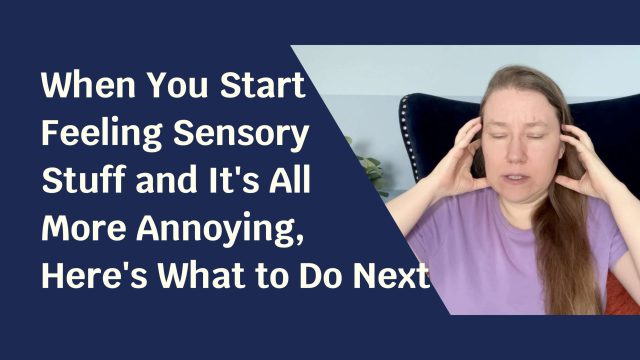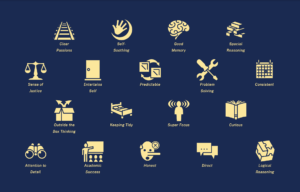
Why is it more annoying?
A pattern that comes up over and over with later identified autistics who are trying to make their lives better is that they encounter people online saying, “Oh, you need to work on your sensory stuff.” And that seems like an easy place to start, and it is compared to a lot of the other places, you can start making your life better.
So they dive in, they figure out all this sensory stuff that they’ve been shutting out, they’ve been working to dissociate from, to ignore, to numb, or to cancel out in various ways. They do find things that they can make better, and yet, it feels like everything is just more annoying. Like it’s more intense. In fact, it doesn’t feel like it’s getting better at all, or maybe a few little things do but overall, it’s just getting on your nerves more.
What I would like to say is: don’t worry, this is a part of the process.
There might be this idea of, “I thought this was supposed to feel better.” What I would like to say is: don’t worry, this is a part of the process. It’s the early part.
Part of what’s going on here is that you’re actually letting in the feelings, the physical sensations (possibly even the emotions), in ways that you haven’t for a long time. That can feel like… it feels. Like there’s actually sensations, or there’s a lot more of them, and that can be unfamiliar.
Part of the overwhelm is simply the increase in awareness of the sensations. Part of it is that it’s unfamiliar, like you don’t know what’s going on. It doesn’t feel like what you’re used to, and in many areas of life, when something is unfamiliar (even when it might be actually a positive thing) just the unfamiliarity of it is hard to deal with.
Part of what’s going on here is that for most of us who learned how to block our sensory experiences, our emotional experiences, who learned to dissociate from them, who blocked it to the extreme of alexithymia (like I did): when we start to feel those things, because we have blocked them for so long we just don’t know what to do with it.
When something is unfamiliar (even when it might be actually a positive thing) just the unfamiliarity of it is hard to deal with.
A very, very likely part of the reason why you started blocking that stuff in the first place was because you grew up in an environment in which you didn’t have the supports to be able to deal with it. So you didn’t have that learning of what was going on and what to do with these feelings, with these sensations.
That’s a new skill set that you can learn, and as you learn that, as you gain more experience with it: it will feel less unfamiliar, and eventually more familiar, and eventually more comfortable.
You gain this experience and you learn new skills on how to deal with the physical sensations, how to recognize and identify emotional inputs, what to do about them, and how to deal with them. As you’re gaining this experience and these new skills, it will actually be getting better and things will be improving. You’ll start to use those physical and emotional sensations as signals for useful information in your life that you can do something with.
Using that input
So, without getting into the entirety of all of these new skills that you can develop, I want to address just an entry point into it. There’ll be other videos where I’ll get into more, but here’s a way to start.
If you can start thinking about physical sensations and emotional inputs as signals for information about something that you need, that’s a good framework to start with. What I mean by that is that when noticing you’re starting to get agitated: start questioning that.
“Okay, so what am I agitated about? Is it a physical thing?” Like, “There’s a sound outside that’s driving me nuts or there’s a smell in here.” or, “My body is in an uncomfortable position. Oh, that’s interesting. Maybe I could move and then my body’s more comfortable and the agitation abates a little bit.”
With “there’s a smell here”, maybe you can turn on a fan, open a window, or add another smell that can mask it. If it’s a lot of noise outside, maybe you can put on some ear defenders, some noise canceling headphones, music or something to drown it out, or (depending on what it is) you may or may not be able to ask the noise to stop.
You can use the agitation that you’re feeling as a way to say, “Okay, so what is it that’s causing this agitation? What am I needing here? What is going on?” If it’s an emotional thing like, “I’m feeling angry, or upset, or overwhelmed, or happy, or excited. What is it that I’m happy/excited/overwhelmed/upset/angry about? What is the source of that and/or what is that feeling trying to tell me? What is it that I need that is creating this sensation?”
“Do I need more peace in my life? Do I need better security? Do I need better communication? Do I need a connection with this person? Do I need to feel valued? Do I need more excitement? Do I need novelty? Do I need…” There’s all sorts of different needs that when they aren’t present in our life, they create emotions.
So that’s a way to start playing with this idea that physical sensations and emotional sensations are information sources that tell you what you need. As you figure out what you need, you have information that you can use to try and find ways to meet those needs, and hopefully make the situation better or recreate a good situation to get in the future.
Take heart, this is a process of becoming more integrated with the information that’s in your body, that’s in your mind.
As you’re beginning this process of making your life better and you’re starting to become more aware of what’s going on inside, and if it’s feeling like everything is more intense, everything is more annoying, everything is just bothering you more, it’s more overwhelming: take heart, this is a process of becoming more integrated with the information that’s in your body, that’s in your mind. It’s unfamiliar, that’s okay. It will become more familiar as you do this.
And as you get more experience in figuring out what’s happening inside you, what are the causes of it, what are the needs for it, and being able to find strategies that are more and more useful to meet those needs: you’ll be gaining a lot of useful skills in making your life better.
Okay, I hope something in this was useful for you, and I hope you have a neurowonderful day. Take care.




